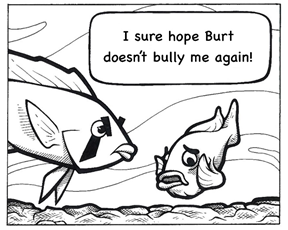
Hey guys! It’s Burt again back with more fun science for you to explore. Last time I told you a little about smell and how it helps me communicate with Toni and other fish in my environment. We saw how the delivery and reception of chemical odorants dissolved in the water are important in mediating social interactions. Just as it’s important for me to communicate with Toni and other fish, it’s also important that systems throughout my body are able to communicate between each other, particularly the immune and nervous systems.
Just like you, my brain allows me to take in information from my environment, process it, and produce an appropriate response. Although this process takes a lot of energy, I’m able to do this fairly well, which is great because I need to perform a variety of behaviors like finding food, dancing for the ladies, defending my territory, and protecting myself from predators. But recently, I’ve been more concerned with how well I’ll be able to perform these basic functions in the future.
You see, some environmental changes like pollution and climate change, can negatively impact my normal physiology. This includes sustaining the factors that help me maintain homeostasis (keeping a constant & stable body environment) so that I can properly evaluate my surroundings and perform those behaviors I mentioned before. My immune system helps to keep me from getting sick in these changing times, but I worry that this stressful lifestyle may also have negative effects on my brain and body!
Because I’m a dominant macho male, hormones like testosterone circulate throughout my body, allowing me to properly perform crucial behaviors. Smaller, less dominant males have much lower levels of testosterone. So that this makes a little more sense, let me introduce you to my not so good friend, Tyrone. Tyrone is far less colorful than I, much smaller, and not nearly as attractive! I’m able to protect my territory from other males like Tyrone that might try to steal it, but whenever I leave to forage or find mates, Toni tells me that he quickly takes advantage of the opportunity by adapting my phenotype (i.e. bright coloration), but as soon as I return he becomes subordinate again. Pretty deceptive trick, Tyrone!

How might physiological differences between myself and Tyrone mediate different immune responses? I talked to Teisha, another graduate student in the Maruska Lab, about my concerns and she says she is on the move to investigate the interactions between the nervous system and mounting an immune response! She believes that addressing these types of questions would also be helpful in understanding immune interactions in other species, even humans! Fish and humans actually have many similarities in our immune responses, one being inflammation which is common in many diseases impacting humans today like Alzheimer’s, arthritis and even diabetes. I feel better already!
So, stay tuned for more information and if you’re interested in reading more about differences between Tyrone and I, check out these papers from the Maruska lab:
Maruska, K.P.and R.D. Fernald. 2018. Astatotilapia burtoni: A model system for analyzing the neurobiology of behavior. ACS Chemical Neuroscience. 9: 1951-1962. link
Maruska, K.P. 2015. Social transitions cause rapid behavioral and neuroendocrine changes. Integr Comp Biol. 55: 294-306. link
Maruska, K.P. 2014. Social regulation of reproduction in male cichlid fishes. Gen Comp Endocrinol. 207: 2-12. link
Maruska, K.P. and R.D. Fernald. 2014. Social regulation of gene expression in the African cichlid fish, Astatotilapia burtoni. pp. 52-78. Oxford Handbook of Molecular Psychology (Canli, T., ed). Oxford University Press. link







Comments
Post a Comment